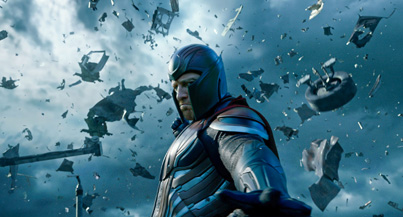|
|
Movie Review: X-Men: ApocalypseBy Ben GruchowMay 31, 2016
We pick up little pieces of various X-Men whereabouts since the last film’s conclusion ten years prior; Professor Xavier (James McAvoy) has dreams of his school becoming a collegiate campus for all people, mutant and non-mutant alike; Magneto (Michael Fassbender) has been holed up in rural Poland, with a wife and daughter, hiding from the authorities and working at one of those industrial factories that seems to produce mostly smoke and fire and grease. There are roughly, oh, 458 named mutant characters in the film, and we get glancing introductions to each one; the movie cheats on its introductions and mostly gets away with it, because we’ve seen these characters in at least three prior films in greater detail, and we’re familiar with their powers. For example, early on we are introduced to the character Storm, played by Halle Berry in earlier films and by Alexandra Shipp here. She is never addressed by that name or any other during the film, but we know who she is because the first thing we see her do is cause a minor dust storm. We get more screen time with Scott Summers (Tye Sheridan), who gets introduced as a high schooler to Xavier’s school for the first time, and scores a good laugh during a demonstration of his capabilities. And we see welcome continuity glimmers with character psychology in Xavier’s interaction with Jean Grey (Sophie Turner). Five years ago, he acted as surrogate big brother to Mystique (played here as then by Jennifer Lawrence); now that she’s gone off on her own, he’s taking the same tack with another powerful and confused mutant. Again, the movie cheats and gets away with it; there is no explication within this film in and of itself as to any special relationship between the two; we get the significance primarily because we’re shorthanding the interactions and doing the film’s work for it.
|

|
|
|

|
Thursday, October 31, 2024
© 2024 Box Office Prophets, a division of One Of Us, Inc.


